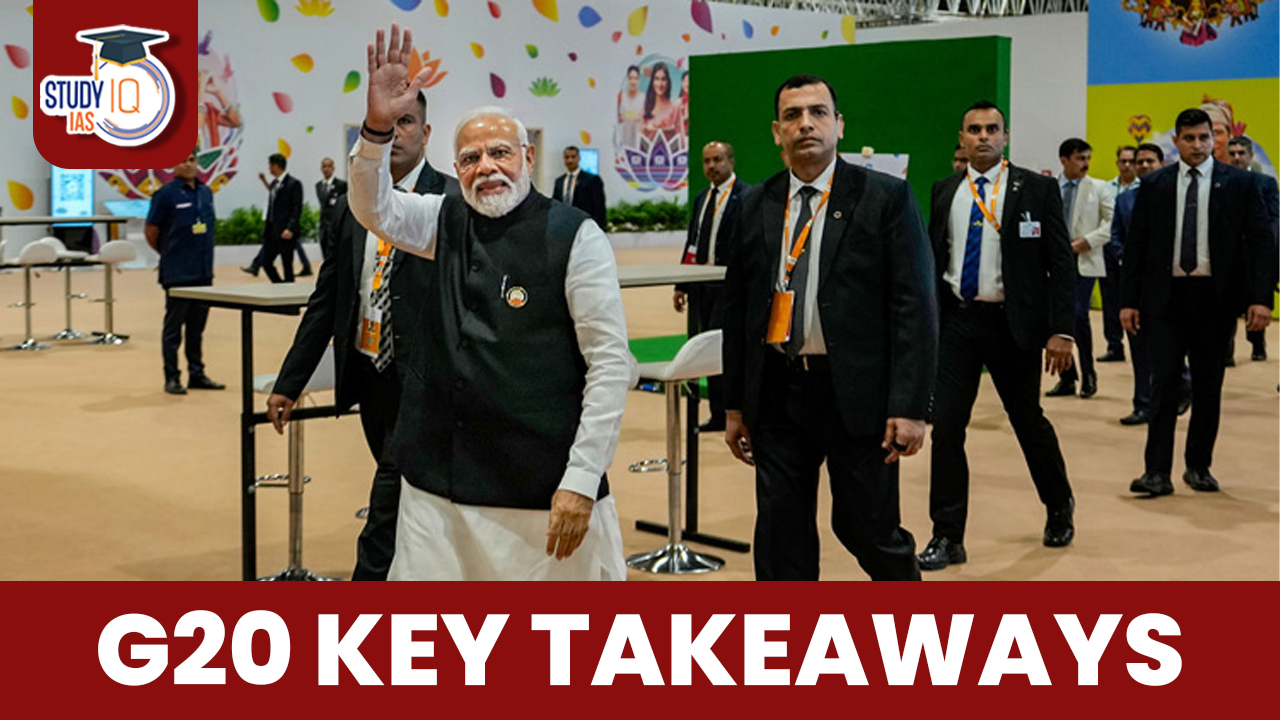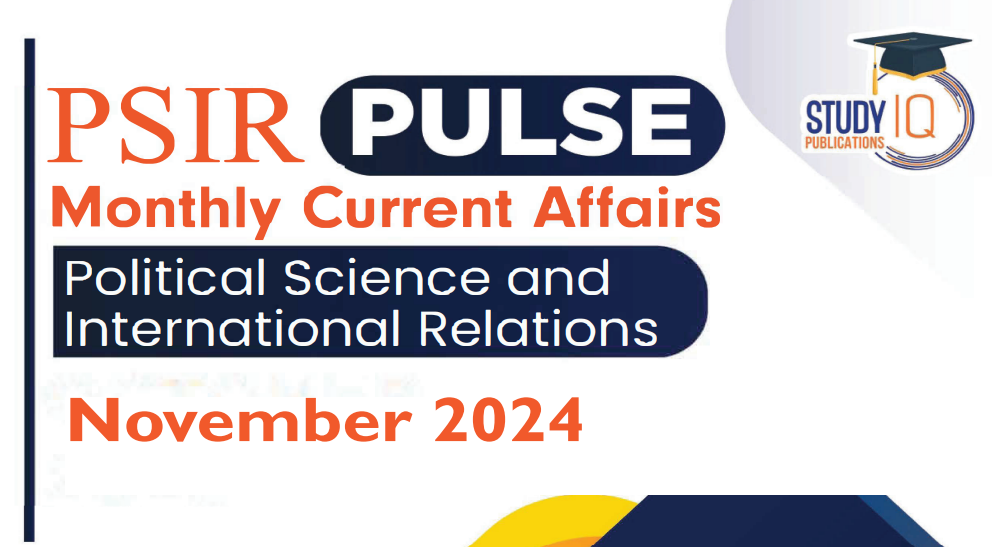| Inclusion of the African Union |
- The 55-member African Union (AU) was formally made permanent member of the G20, on par with the European Union, in order to make the grouping more representative.
- Until now only South Africa was a member of the G20.
- The entry of the AU would provide greater voice to the Global South within the G20 where the G7 countries have long played a dominant role.
- The move also came after the BRICs was expanded to include Saudi Arabia and Iran among other nations which was seen as an attempt by Beijing to make it a possible alternate to the G20.
|
| New Delhi Declaration |
- The New Delhi Leaders’ Summit Declaration was adopted with a 100 per cent consensus on the opening day of the G20 Summit.
- Here is a snapshot of the consensus in the declaration on the six priorities India had identified in its presidency.
- Growth, economy and jobs:
- The Declaration recognizes the fragile state of global economy and the need for balanced policies to promote sustainable growth, reduce inequality, and maintain stability.
- It underscores the commitment of G20 central banks to achieve price stability, prioritize central bank independence.
- Additionally, the declaration emphasizes the use of temporary and targeted fiscal measures to safeguard vulnerable populations.
- It acknowledges the pivotal role of the private sector in establishing inclusive and resilient global value chains.
- The declaration also underscores the importance of a rules-based, fair, transparent multilateral trading system with the WTO.
- Financial Inclusion and DPI:
- The declaration promotes the responsible use of technological innovations, especially innovative payment systems, to achieve financial inclusion.
- The G20 has also embraced the 2023 Financial Inclusion Action Plan (FIAP), which outlines a roadmap for financial inclusion, particularly for individuals and MSMEs.
- For the first time the G20 leaders have adopted a comprehensive definition of Digital Public Infrastructure (DPI).
- India plans to create a Global Digital Public Infrastructure Repository (GDPIR), and the proposal of the One Future Alliance (OFA), a voluntary initiative to implement DPI in low and middle-income countries.
- Sustainable Development Goals (SDGs):
- The leaders recognized setbacks in achieving SDGs and committed to mobilizing affordable financing to support developing countries.
- Hunger and Food Security: The G20 adopted the Deccan High-Level Principles on Food Security and Nutrition, emphasizing research cooperation, improved access to agricultural resources, and fair agricultural trade. Export prohibitions were discouraged.
- Health: Commitments were made to strengthen primary healthcare and health workforce and to improve essential health services. Equitable access to medical countermeasures was prioritized.
- Education: The G20 pledged inclusive, equitable, high-quality education and digital technology utilization to bridge divides.
- Climate:
- Paris Agreement Implementation: G20 members committed to fully implementing the Paris Agreement, considering equity and the principle of common but differentiated responsibilities (CBDR).
- Net-Zero Emissions: A significant commitment was made to achieve global net-zero emissions or carbon neutrality around 2050, taking into account scientific developments and various approaches.
- Sustainable Lifestyles: G20 leaders endorsed principles promoting sustainable lifestyles to combat climate change, aiming for significant emissions reductions by 2030.
- Energy Transitions: Emphasis was placed on accelerating clean, affordable, and inclusive energy transitions, including tripling global renewable energy capacity by 2030 and supporting developing countries in their low-carbon transitions.
- Climate Finance: The declaration recognized specific pathways for climate finance, including public finance, private finance, and Multilateral Development Banks (MDBs).
- MDB Reforms:
- The G20 leaders endorsed a roadmap for implementing the capital adequacy framework (CAF) recommendations while ensuring the financial sustainability and credit ratings of MDBs.
- They encouraged collaboration among MDBs in areas like hybrid and callable capital, potentially unlocking an additional $200 billion in lending capacity over the next decade.
- Women-led Development:
- The G20 declaration commits to promoting “women-led development” and ensuring women’s equal participation in decision-making.
- This involves various measures such as improving education, employment opportunities, social protection, and eliminating gender–based violence and biases.
- A new Working Group on Empowerment of Women will be established to support these efforts during the Brazilian G20 Presidency.
|
| India-Middle East-Europe Economic Corridor |
- India, the US, the UAE, Saudi Arabia, France, Germany, Italy, and the European Union jointly signed a Memorandum of Understanding (MoU) to establish the India-Middle East-Europe Economic Corridor (IMEE-EC).
- The corridor will include a set of rail and ports links between the Middle East and South Asia and eventually to Europe.
- This corridor aims to foster economic integration and connect Asia with Europe, presenting a strategic challenge to China’s Belt and Road Initiative.
- It is part of the Partnership for Global Infrastructure Investment (PGII), which is a collaborative effort by G7 nations to fund infrastructure projects in developing nations.
|
| Global Biofuels Alliance |
- Prime Minister Narendra Modi announced the launch of the Global Biofuels Alliance (GBA).
- Nineteen countries and twelve international organisations, including both G20 members and non-members, have agreed to join this alliance.
- India, Brazil, and the US are the alliance’s founding members.
- GBA aims to serve as a catalytic platform, fostering global collaboration for the advancement and widespread adoption of biofuels.
- The alliance will also act as a central repository of knowledge and an expert hub.
|
| ‘Different views’ on Ukraine |
- During the G20 summit, leaders had differing perspectives on the Ukraine war, which has been a contentious issue since Russia’s invasion.
- The New Delhi Declaration denounced the use of force for territorial gain, but refrained from direct criticism of Russia by name.
- Unlike in last year’s Bali Declaration in which Russia was described as the aggressor and asked to withdraw its troops from Ukraine fully and unconditionally, the New Delhi Declaration called it “the war in Ukraine”. There was no condemnation of Russia either, unlike in Bali.
|


 Coconut Oil Taxation in India
Coconut Oil Taxation in India
 India-made Solar Photovoltaic (PV) Cells...
India-made Solar Photovoltaic (PV) Cells...
 Tree Census: Supreme Court Ruling on Tre...
Tree Census: Supreme Court Ruling on Tre...




















